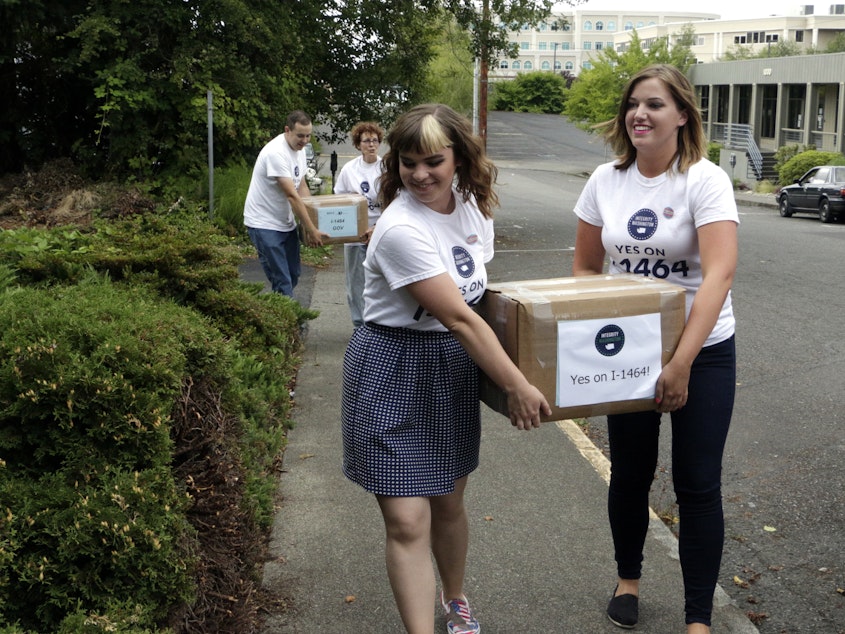$14M fuels initiatives on the November ballot. Who's behind the money?

The vast majority of money going into initiative campaigns this year in Washington state has come in lumps of $10,000 or more, from a small number of wealthy individuals and special interests, according to a KUOW analysis of state campaign-finance reports.
The campaigns have been fueled by $14 million in contributions to date, mostly from billionaires, unions and out-of-state interests.
A contribution in the tens or hundreds of thousands of dollars is much bigger than a candidate for office can accept, but the restrictions on candidates don't apply to ballot initiatives. The sky's the limit, so it's not uncommon to see six-figure contributions.
Entrepreneur and Code.org co-founder Hadi Partovi of Bellevue gave the I-1464 campaign $99,999.99.
It aims to reduce the influence of big money on state elections.
Sponsored
Among other provisions, I-1464 would give voters $150 in vouchers to donate to qualifying candidates they choose, similar to a clean-elections initiative Seattle voters passed in 2015.
"Americans believe in a government of the people, for the people, by the people. But our current system doesn't feel like it's doing that," Partovi said. "It feels like it's overly influenced by the influence of money in politics and that the few have an outsized voice."
Source: Washington State Public Disclosure Commission, as of July 12, 2016. Graphic: KUOW/Abraham EptonOf course, few Americans can drop tens of thousands of dollars on their favorite political campaign, as Partovi did in April. Partovi said he does recognize the oddity of doing essentially what he's helping campaign against."The only way we can fix the system is within the system we have," he said. "I wouldn't be supporting an idea if it weren't wildly popular."Partovi said there's a big difference between supporting a candidate and supporting an idea."You can't corrupt the idea, you know what I mean?" he said. "The problem with money in politics is candidates are influenced by who gives money to them. You can't avoid that."Top Read: A man shouts racial slurs in a Seattle Starbucks. The silence is deafeningConnie Ballmer, wife of former Microsoft CEO Steve Ballmer, also gave $500,000 to I-1464.She declined to be interviewed, but the I-1464 campaign issued a statement on her behalf, stating, "Like many Americans, I am disheartened by the outsized role of money in politics." Big donors often benefit financially when their candidates or initiatives win. Partovi said there's zero personal benefit for him if I-1464 passes, other than an improved democracy.
Source: Washington State Public Disclosure Commission, as of July 12, 2016. Graphic: KUOW/Abraham EptonOne person who does benefit personally from initiatives is signature king Angelo Paparella. He runs PCI Consultants in Calabasas, California."We do more signatures than any other firm in the country," he said.PCI's thousands of part-time contractors gather millions of voter autographs each year, at prices reportedly ranging from $1 to $6 a signature."For whatever reason, the number of petitions trying to qualify [this year] is the most I've ever seen," Paparella said. "We had 16, 17 petitions on the streets at one time in California."All six of Washington’s current statewide initiatives have relied on paid signature gatherers – at a combined cost of $4.3 million, according to Washington State Public Disclosure Commission data. Four of the initiatives still need to have their signatures verified by the Washington Secretary of State, a process expected to take a few weeks.
Source: Washington State Public Disclosure Commission, as of July 12, 2016. Graphic: KUOW/Abraham EptonPCI solicited signatures for five Washington state initiatives this year, earning $3.7 million in the process.Only Initiative 735, which urges amending the U.S. Constitution to limit money in politics, and carbon-tax Initiative 732 made it to the ballot without using PCI. Those campaigns paid other signature firms, including Your Choice Petitions of Spokane and Bockwinkle Communications of Tacoma.Paparella said PCI also does a lot of work in Michigan, Ohio and Florida. Twenty-four states use the initiative process. Some political observers have told KUOW that paid signature gathering allows anyone with a million dollars or more to put their pet issue in front of voters. They said the process corrupts the original intent of citizens' initiatives: to provide a direct form of democracy for citizens stymied by legislatures beholden to special interests.Paparella said critics are missing the point and that initiatives have enabled important reforms — like assisted suicide and legal marijuana — that would never have made it through the legislature."The fact that people are signing petitions is an expression of democracy," he said. "They want to see this issue voted on.""You can do two things if you don't like the process," Paparella said. "People will stop signing [initiatives], or maybe the legislature will start addressing some of these issues and there'll be no need for it."Health care union SEIU 775 is this year’s biggest initiative spender to date. It has pumped $1.2 million into the campaign for I-1501. In fact, the union is the only donor to the measure.I-1501 would increase the penalties for identity theft against seniors and prevent the state from releasing the identities of their caregivers, many of whom are members of SEIU 775. That provision would help SEIU fend off anti-union efforts from conservative activists with the Freedom Foundation (as KPLU first reported).SEIU 775 spokesperson Adam Glickman did not respond to KUOW's interview requests for this story.Venture capitalist Nick Hanauer and billionaire Steve Ballmer have each given $500,000 to gun-control initiative I-1491. It would prevent people found by a judge to be a risk to themselves or others from buying or keeping guns.Hanauer has also given $500,000 to I-1433 to raise the minimum wage to $13.50 by 2020.Hanauer declined to be interviewed; Steve Ballmer did not respond to interview requests.
Sponsored
Source: Washington State Public Disclosure Commission, as of July 12, 2016. Graphic: KUOW/Abraham Epton
Source: Washington State Public Disclosure Commission, as of July 12, 2016. Graphic: KUOW/Abraham Epton

